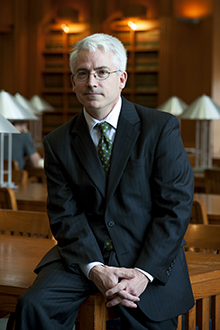Will other same-sex marriage bans fall?

David Meyer, dean of the Tulane Law School, says the Supreme Court's decisions will make it harder for states to defend laws denying marriage to same-sex couples. (Photo by Paula Burch-Celentano)
David Meyer, dean of the Tulane Law School, says the Supreme Court's decisions “calculatedly leave more time for popular debate but also strongly imply that, in the end, there may be only one constitutionally permissible answer.”
While the court sidestepped the question of a constitutional right for gays and lesbians to marry, Meyer says, “As Justice [Antonin] Scalia accurately pointed out in his red-hot dissent, the court's decision striking down the federal Defense of Marriage Act has plainly cleared a path for future legal challenges and will make it harder for states to defend laws denying marriage to same-sex couples.”
In a case from New York, U.S. v. Windsor, the justices said DoMA violates the 5th Amendment's equal protection guarantee. Justice Anthony Kennedy wrote the opinion for the 5-4 majority, saying DoMA wrongly disadvantaged couples to whom some states had extended marital protections.
In a separate case, Hollingsworth v. Perry, a different 5-4 majority said that private individuals couldn't use the courts to reinstate California's ban on same-sex marriage when state officials chose not to defend the law, known as Proposition 8.
Now, same-sex marriage is legal in 13 states and the District of Columbia.
DoMA said that same-sex spouses in states where gay marriage is legal weren't entitled to the same federal benefits as male-female spouses. More than 1,000 federal provisions were at issue, including Social Security, income tax, bankruptcy and veteran's benefits.
Now, those couples “are just as married in the light of federal law as heterosexual couples,” says Stephen Griffin, the Rutledge C. Clement Jr. Professor in Constitutional Law at Tulane.
Linda P. Campbell is the director of communications at the Tulane Law School.
